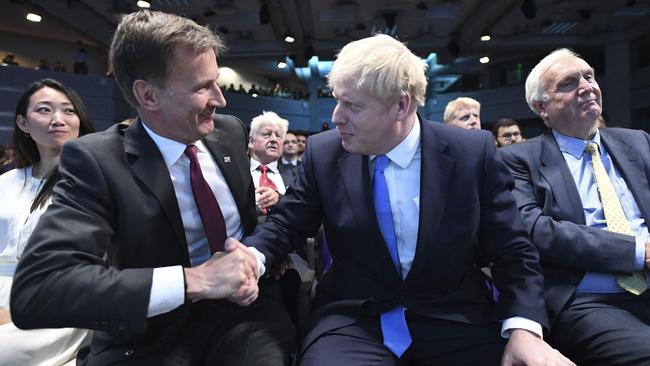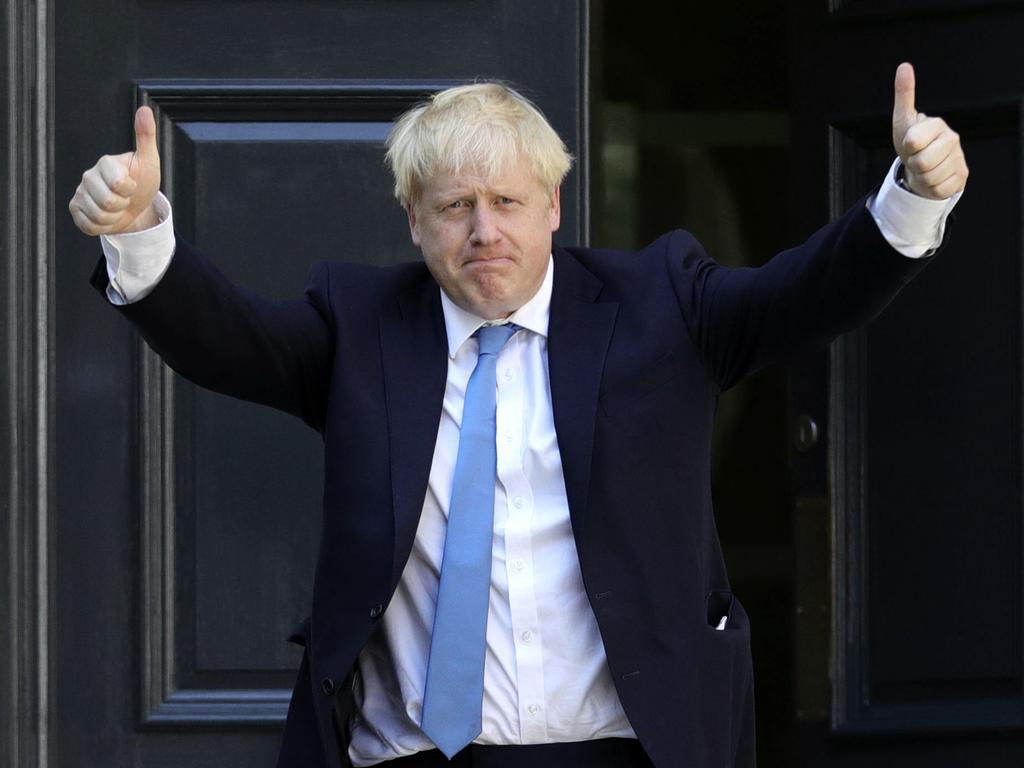Boris Johnson to become next British PM after beating Jeremy Hunt in Tory party vote
The new PM vows to bring peace to his party, ignite a national spirit and defeat Jeremy Corbyn after winning the party leadership.
Britain’s new pro-Brexit prime minister Boris Johnson has promised to bring peace to his warring Conservatives, ignite a national spirit of can-do and defeat Labour’s Jeremy Corbyn in a rousing speech after winning the party leadership.
A tranche of bitter Remainer MPs from the Tory party is threatening to scupper Mr Johnson as soon as he is sworn in by the Queen tomorrow, demanding he row back from his Brexit ultimatum of taking the country out of the EU on October 31 even without a deal.
But moments after being announced as the new leader of the Conservative Party, Mr Johnson was defiant, saying: “This pivotal moment in our history, we again have to reconcile two sets of instincts, two noble sets of instincts, between the deep desire for friendship and free trade and mutual support in security and defence between Britain and our European partners, and the simultaneous desire — equally deep and heartfelt — for democratic self-government in this country.’’
He has a reputation for getting things done and making things happen. I wish him all the best as he charts the way forward for the UK. We have a great relationship with the UK and it will remain so with Boris. 🇦🇺 🇬🇧
— Scott Morrison (@ScottMorrisonMP) July 23, 2019
Congratulations to Boris Johnson on becoming the new Prime Minister of the United Kingdom. He will be great!
— Donald J. Trump (@realDonaldTrump) July 23, 2019
After easily winning the poll, attracting 92,153 votes to Foreign Secretary Jeremy Hunt’s 46,656, he promised to energise the country: “We will deliver Brexit, unite the country and beat Jeremy Corbyn.”
He also raised a laugh by talking about his priorities — “deliver, unite and defeat’’ — noting it formed the acronym dud, but he said that missed the final element of “energise”.
“E for energise, I say to the doubters. Dude, we are going to energise the country, get Brexit done and bring in a new spirit of can-do,’’ he said.
The restive Remainer backbenchers — who number about 40 — will now scrutinise Mr Johnson’s statements over the next few days before deciding whether they will force a constitutional crisis.
Mr Johnson’s choice of chancellor, foreign secretary, Brexit secretary and home secretary will also send a signal about how inclusive he intends to be, or whether he wants to try to steamroll Brexit through.
The situation is so fragile that in the coming months the Queen could be asked to defy centuries-old tradition and prorogue parliament; some Tories — believing a no-deal Brexit would be so calamitous to the nation that they will extinguish their own political futures — could cross the floor to support a no-confidence motion; or there could be a snap general election.
The European question has claimed the careers of Tory leaders since Margaret Thatcher, the latest being Theresa May, who failed to deliver Brexit.

In a hint of the chaos that might ensue, Alan Duncan, a Tory MP and Foreign Office minister, resigned on Monday and tried to have an emergency House of Commons debate on whether Mr Johnson, 55, commanded enough support.
He was joined by junior minister Anne Milton, who said she had “grave concerns” about the prospect of leaving the EU without a deal.
Mr Duncan derided Mr Johnson as “haphazard’’ and “making decisions by the seat of his pants’’. But the attempt to shackle Mr Johnson before he had even met the Queen was avoided when the Speaker of the House, John Bercow, refused to allow the debate.
Scott Morrison tweeted congratulations to Mr Johnson: “He has a reputation for getting things done and making things happen. I wish him all the best as he charts the way forward for the UK.”
US President Donald Trump also sent his congratulations, tweeting “He will be great!”
Mrs May will take the final question time of the current session late tonight (AEST), meaning Mr Johnson can avoid prime minister’s questions until the parliament resumes on September 3, giving him time to build some sort of consensus.
We look forward to working constructively w/ PM @BorisJohnson when he takes office, to facilitate the ratification of the Withdrawal Agreement and achieve an orderly #Brexit. We are ready also to rework the agreed Declaration on a new partnership in line with #EUCO guidelines.
— Michel Barnier (@MichelBarnier) July 23, 2019
Johnson’s first task will be to bring his warring party, and the country, together and bring about the exit of Britain from the European Union.
Minutes before the ballot announcement junior minister Anne Milton resigned, saying she had “grave concerns” about the prospect of leaving the EU without a deal.
May couldn’t deliver her dangerously flawed version of Brexit — which could have tied the UK to the EU indefinitely — and the new Tory leader and prime minister will have to find a way out of the parliamentary arithmetic.
Johnson has inherited May’s disastrous decisions — including the election of 2016 when she lost her large majority, meaning the Conservatives rule only with the confidence and supply of Northern Ireland’s Democratic Unionist Party.
The slim working majority is down to two, and with some Remainer MP’s facing future de-selection at grassroots level, they will have little to lose to try and torpedo Johnson’s plans.
Sources close to Johnson say he is readying to spark the British economy with investment in big infrastructure projects, as well as spending on schools and social projects.
He also wants to reduce tax rates.
Jeremy Corbyn’s Labour Party is poised to wait a week or two before calling a vote of no confidence in the Prime Minister and believe they will be able to command a cross party government to deal with the Brexit crisis.





To join the conversation, please log in. Don't have an account? Register
Join the conversation, you are commenting as Logout